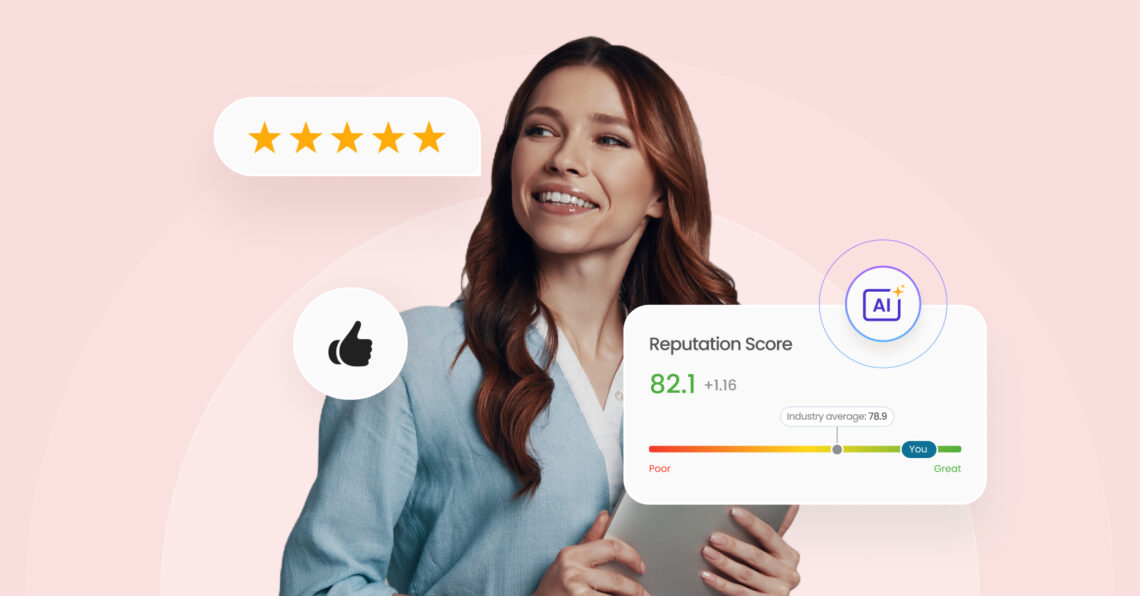Online reputation monitoring is the ongoing practice of tracking what customers see and say about your brand across reviews, search, listings, social media, and customer conversations, then acting quickly to protect trust.
Summary
A brand’s success now ties closely to what people find online before they ever call, book, or buy. Businesses that monitor reputation consistently can spot issues early, respond with confidence, and keep customer sentiment moving in the right direction. Many leaders assume monitoring means watching reviews and social mentions, but that is only part of the picture. Real monitoring also includes search visibility, listing accuracy, recurring customer themes, and whether location teams close the loop on feedback. Birdeye’s GenAI tools help brands do this at scale by unifying signals across channels, automating smart actions, and turning feedback into clear next steps.
This blog covers what online reputation monitoring really includes and why it impacts customer decisions. We will also explore the essential tools teams rely on and how Birdeye’s GenAI capabilities support consistent positive reputation performance across digital channels.
Table of contents
- Why is online reputation monitoring important?
- The real cost of ignoring your online reputation
- Essential components of online reputation monitoring
- Steps to effectively monitor your online reputation
- How reputation management tools work
- Most valuable features in reputation management software
- Benefits of using reputation management tools
- How Birdeye’s reputation management software enhances brand’s monitoring
- Popular tools for online reputation monitoring
- FAQs about online reputation monitoring
- Choose Birdeye for your 360° online reputation monitoring
What is online reputation monitoring? Online reputation monitoring is the systematic tracking and analysis of your brand mentions across digital channels. This process involves monitoring review sites, social media platforms, and other online spaces where your brand is mentioned online. Modern reputation management software helps businesses gain actionable insights into customer sentiment, enabling them to manage negative reviews, promote positive reviews, and maintain a strong business reputation.
Why is online reputation monitoring important?
Think of online reputation management as your business’s digital credit score. Like a good credit score, a strong reputation unlocks financial opportunities—building trust, attracting customers, and driving business growth. However, unlike a credit score, your online reputation changes daily, shaped by every customer interaction, review, and social media comment.
Think about how decisions are made in today’s digital space. Before a potential client signs a contract, a customer makes a purchase, or a candidate accepts a job offer, they’re likely conducting their due diligence through online reviews, social media research, and digital footprint analysis. This isn’t just casual browsing; it’s a critical part of their decision-making process.
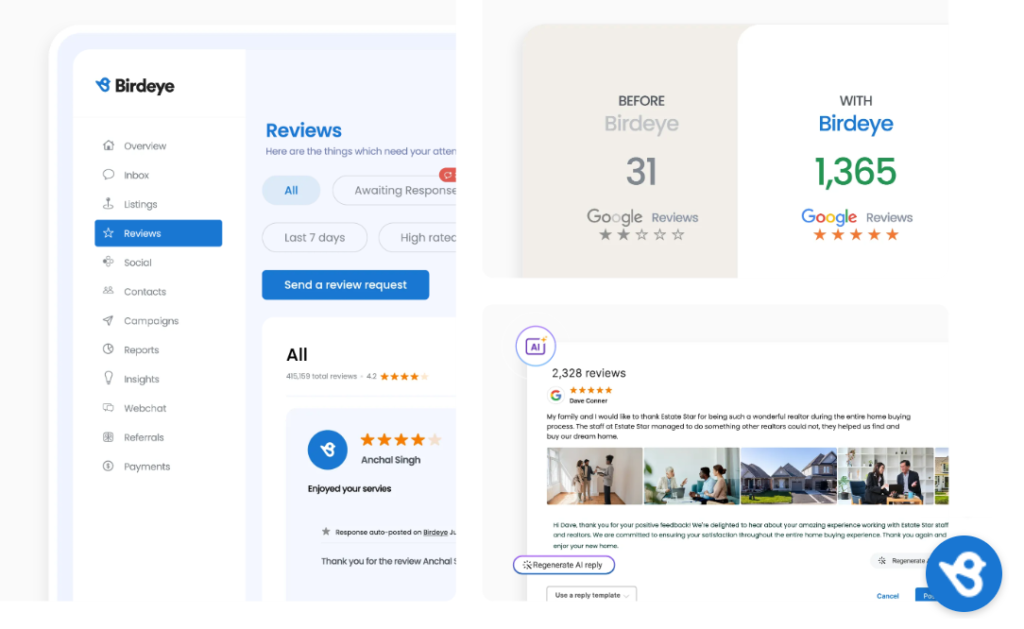
What makes reputation management particularly crucial is its compound effect on business operations:
Market position and competitive edge
When businesses maintain strong review management practices, they preserve their reputation and build a competitive advantage that’s difficult for competitors to replicate. This advantage manifests in:
- Higher conversion rates from prospects
- Stronger negotiating positions with partners
- Better talent acquisition opportunities
- Increased customer lifetime value
- Enhanced brand resilience
Customer decision journey
Modern customer relationships are shaped long before the first direct interaction. Your digital presence influences:
- Initial brand discovery and consideration
- Comparison with competitors
- Purchase decision validation
- Post-purchase satisfaction levels
- Long-term loyalty development
Operational intelligence
Effective online reputation management provides invaluable business intelligence. By systematically monitoring customer sentiment and feedback patterns, businesses gain:
- Early warning signs of emerging issues
- Validation of service improvements
- Insights into competitive positioning
- Understanding of market trends
- Opportunities for innovation
We see a clear pattern when we look at businesses that excel at reputation management. They don’t just react to what people say about them online—they actively shape the narrative, engaging in meaningful conversations that pave the way for long-term trust.
The real cost of ignoring your online reputation
Neglecting your online reputation can have a far-reaching impact beyond lost sales or negative reviews. It creates a ripple effect that can undermine your entire business.
Immediate impact
When businesses fail to implement proper reputation monitoring, they face:
Loss in revenue
The financial impact extends far beyond just lost sales. It leads to:
- Reduced ability to command premium pricing
- Higher customer acquisition costs
- Increased price sensitivity from skeptical customers
- Reduced effectiveness due to negative brand mentions
- Limited referral opportunities
Market position deterioration
The absence of active reputation management leads to:
- Competitors defining your narrative
- Unaddressed negative feedback shaping perceptions
- Lost ground in search engine results
- Weakened ability to manage crises
- Diminished brand image
Long-term consequences
Strategic limitations
Poor online reputation management creates lasting challenges:
- Restricted growth opportunities
- Limited partnership options
- Talent acquisition difficulties
Trust deficit
Perhaps most critically, ignoring your digital reputation creates a trust deficit that affects:
- Customer acquisition efficiency
- Employee retention rates
- Stakeholder confidence
- Business resilience
Hidden costs
Operational inefficiencies
Poor reputation management leads to:
- Increased crisis management needs
- Higher customer service demands
- Lost productivity handling issues
The most damaging effect of neglecting online reputation monitoring is how problems compound over time. What starts as a few unaddressed negative reviews can evolve into a persistent trust deficit that is far costlier to fix than to prevent.
This isn’t just about maintaining a positive image—it’s about protecting your business’s fundamental ability to operate effectively.
The question then becomes: how do we build a robust system to prevent these costly scenarios?
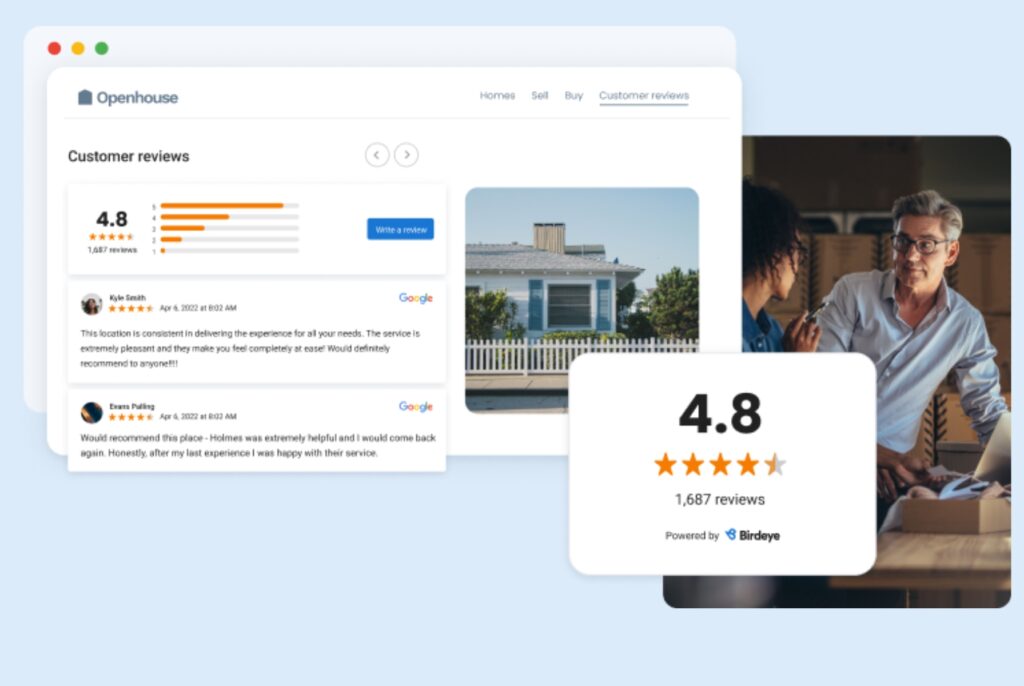
Essential components of online reputation monitoring
Businesses need a comprehensive monitoring and response system to avoid the cascade of problems that come with neglected reputation management. Modern online reputation monitoring has evolved beyond simple positive review tracking precisely because the costs of inadequate monitoring are so severe. Today’s digital landscape demands a sophisticated approach that combines technological capability with strategic insight.
Organizations that excel at managing their brand’s online reputation understand that success comes from orchestrating multiple elements into a cohesive strategy. This strategy must not only capture and analyze digital feedback in real-time but also provide the framework for rapid response and continuous improvement.
Comprehensive monitoring framework
Think of monitoring your online reputation as listening to a crowded room where everyone’s talking about your business. You can’t just focus on the loudest voices or the people directly in front of you—you need to hear every important conversation happening in every corner. That’s what a comprehensive monitoring framework does for your brand’s online reputation.
What makes this framework truly effective isn’t just collecting more data—it’s about collecting the right data from the right places. Let’s break down where these conversations are happening and why each matters:
Direct feedback channels
These are the places where customers intentionally come to talk about their experiences with your business. It’s like having a suggestion box, but one that’s visible to the whole world:
- Review sites: This is where customers share their detailed stories, from glowing praise to constructive criticism. Each review offers specific insights into what’s working and what isn’t.
- Business listings: Your profiles on Google Business, Yelp, and industry directories aren’t just contact information—they’re often the first impression potential customers get of your business that affects your reputation management.
- Direct customer feedback: Surveys and direct communications give you controlled ways to gather insights. Think of these as your structured conversations with customers.
AI search visibility and accuracy
Search behavior is evolving. More people now ask AI platforms questions such as “best option near me” and trust the summaries they receive. That makes reputation monitoring bigger than reviews and mentions. It also includes whether AI systems show your brand, describe it correctly, and reflect the trust signals you have worked hard to build across locations.
Birdeye Search AI supports this by helping multi-location teams track how often they appear in AI-generated answers, spot when the description turns negative or inaccurate, and identify what to improve, such as listings, reviews, or content that AI relies on.

Indirect feedback sources
Sometimes the most honest conversations about your business happen when customers think you aren’t listening. These indirect channels often reveal unfiltered opinions and emerging trends:
- Social media platforms: This is where casual conversations happen. A customer might not write a formal review, but they’ll definitely tweet about their experience, good or bad.
- Industry forums and professional networks: Especially important for B2B businesses, these platforms often host detailed discussions about products and services.
Competitive landscape
Understanding your own reputation is only half the story. Your brand exists in a marketplace where competitors are also vying for attention and trust. Smart reputation monitoring includes keeping tabs on:
- Competitor review management practices: Understanding how other businesses in your space handle customer feedback can reveal both opportunities and potential pitfalls.
- Market positioning shifts: When competitors change their messaging or service offerings, it often shows up first in customer discussions and reviews.
- Industry sentiment trends: Sometimes, issues affecting your reputation management aren’t about your business specifically—they’re about your entire industry.
Sentiment understanding
Modern reputation management software should turn information into actionable insights. It’s not just about whether people are talking about your brand—it’s about understanding the emotions and intentions behind their words:
- Advanced sentiment analysis: This goes beyond categorizing feedback as positive or negative. Good analysis understands context and nuance.
- Trend identification: Sometimes, a single comment isn’t significant, but a pattern of similar feedback demands attention.
- Evolution tracking: Understanding how public perception changes over time helps you measure the impact of your improvements.
Steps to effectively monitor your online reputation
Understanding the components of reputation monitoring is only half the battle—putting them into action is what ensures success. Let’s break down the practical steps to implement an effective monitoring system that protects and enhances your online reputation.
Establish your baseline
Before you can improve something, you need to know where you stand. Think of this as taking a snapshot of your current online presence:
- Document current performance across major review platforms and social media
- Analyze existing customer sentiment and feedback patterns
- Identify immediate reputation risks and opportunities for growth
Pro-tip: Deploy reputation monitoring tools across all digital channels to maintain a comprehensive view of brand mentions and enable swift response to emerging issues.
Set goals and metrics
Define what success looks like for your reputation management efforts:
- Set realistic improvement targets for review ratings, customer sentiment, and response times
- Identify marketing key performance indicators (KPIs) tied to your business goals
- Define clear monitoring priorities based on platforms and channels most relevant to your audience
Build your monitoring infrastructure
With your baseline established, it’s time to set up the systems that will help you track and manage your reputation:
- Select and implement appropriate reputation management tools
- Configure automated monitoring and alerts on brand mentions and reviews
- Establish integration with your existing business processes to streamline workflows
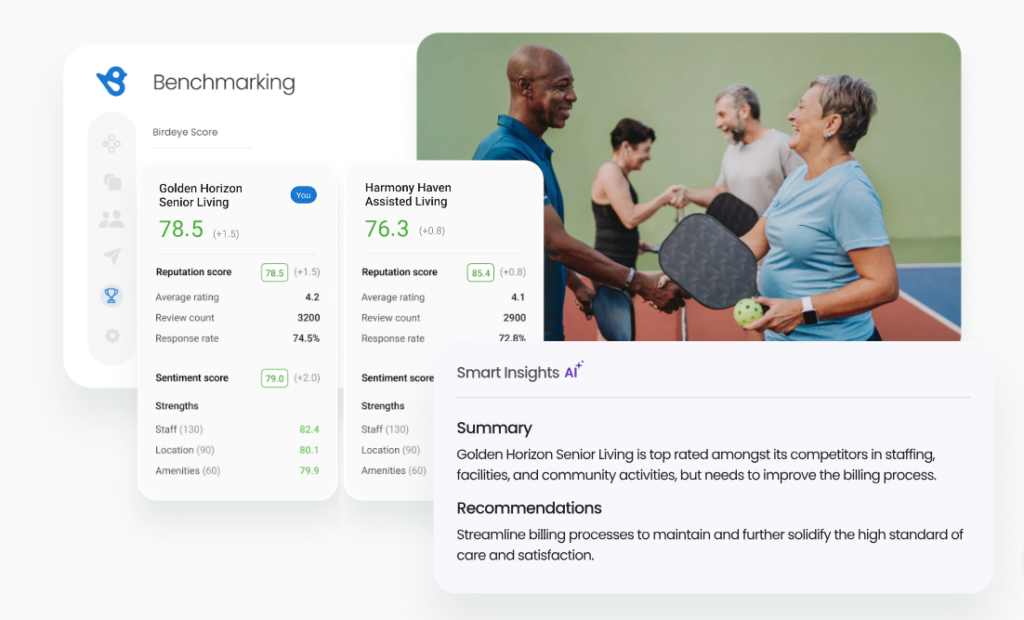
Implement response protocols
Having a robust monitoring system is only half the battle. You need clear protocols for what to do with the information you gather:
- Develop guidelines for engaging with both positive and negative feedback
- Create response templates that maintain brand voice while being personal
- Establish time frames for different types of responses
Prepare a crisis management plan
Be ready for reputation challenges:
- Create clear action plans for potential reputation threats
- Establish communication protocols for serious issues
- Define triggers for escalation to senior management when necessary
Pro-tip: Leverage reputation monitoring software to detect potential crises before they escalate by setting up custom alerts for negative sentiment spikes.
Manage Posts, Reputation, and Reporting across Locations
Want to see the impact of Birdeye on your business? Watch the Free Demo Now.
How reputation management tools work
Reputation management tools function by gathering data from various sources where businesses are mentioned, including social media, review platforms, and blogs. These tools analyze mentions to provide insights into how a brand is perceived online.
They enable businesses to track feedback in real time, helping them respond to customer reviews promptly. AI-powered features analyze customer sentiment, highlighting areas of concern and opportunities for improvement. This process helps businesses address issues before they escalate and ensures their digital reputation remains intact.
Additionally, reputation tools simplify managing multiple review sites, offering a unified view that streamlines monitoring and engagement. By automating repetitive tasks, they save time for internal teams while maintaining a consistent and favorable brand image.
Most valuable features in reputation management software
Advanced software solutions for reputation management include features designed to optimize online monitoring and engagement. Real-time alerts notify businesses immediately when their brand is mentioned online, enabling swift action.
Here are the most valuable features to consider:
- Real-time alerts: Tools like Google Alerts provide instant notifications whenever your brand is mentioned online, helping you respond quickly to positive and negative feedback.
- Sentiment analysis: Gain deeper insights into customer opinions by analyzing neutral mentions, positive sentiment, and negative reviews to identify trends in customer sentiment.
- Social listening: Monitor discussions across various social media platforms to understand your audience better and enhance your digital presence.
- Centralized review management: A robust platform consolidates reviews from multiple review platforms into a single dashboard, streamlining the process of addressing online reviews.
- Brand mentions tracking: Advanced tools track mentions of your brand, enabling businesses to safeguard their brand image and ensure consistent communication.
Benefits of using reputation management tools
Reputation management tools consolidate customer feedback from various channels and provide actionable insights that help improve customer experiences.
They help businesses build trust by addressing customer concerns promptly. This proactive approach strengthens customer relationships and attracts new customers through positive word-of-mouth. Here’s how these tools benefit organizations:
- Boost online reputation proactively
These tools help businesses identify and address potential issues before escalating, ensuring a consistently positive online reputation. - Increase efficiency with automation
Reputation management tools automate tasks like review collection and response tracking, saving time for internal teams and allowing them to focus on strategic initiatives. - Enhance decision-making with comprehensive data
By aggregating data from various channels, these tools offer businesses valuable insights into trends and patterns, aiding in data-driven decision-making. - Improve customer acquisition strategies
A well-managed reputation attracts new customers by showcasing its reliability and responsiveness, giving it a distinct edge in competitive markets.
How Birdeye’s reputation management software enhances brand’s monitoring
Birdeye stands out by solving a problem that frustrates many business leaders: fragmentation. Instead of juggling multiple tools, Birdeye’s GenAI reputation management software brings everything you need under one roof.
Here are the key features of Birdeye’s online reputation management software that help businesses build and maintain a solid digital presence:
Competitive benchmarking tool
Birdeye’s Competitors AI is a benchmarking tool that provides businesses with a view of their market positioning. By comparing key metrics against competitors, this tool enables brands to:
- Identify local competitors in their industry
- Track review volumes, ratings, and sources
- Gain actionable insights to improve market standing
- Understand strengths and weaknesses in real-time
- Develop strategic plans to outperform rivals
The tool uses advanced AI to deliver contextual summaries and recommendations, allowing businesses to make data-driven decisions that enhance their competitive edge.
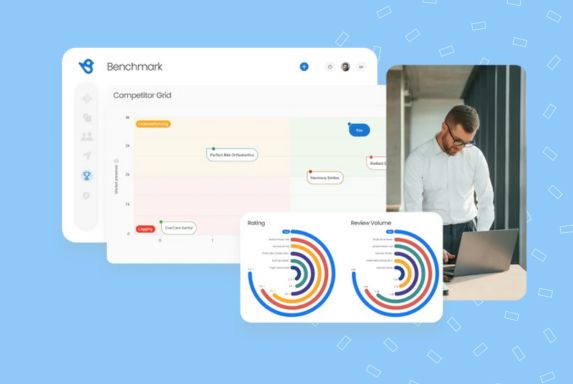
Insights analysis tool
The Insights AI analysis tool delves deep into customer feedback, offering unprecedented insights into brand perception. Key features include:
- Analyzing customer sentiment across online reviews and surveys
- Providing detailed insights into how customers feel about the brand
- Breaking down feedback by location, category, and specific attributes
- Identifying positive, negative, and neutral trends in customer interactions
- Generating AI-powered summaries to quickly understand complex feedback
- Helping businesses pinpoint areas for improvement and customer experience enhancement
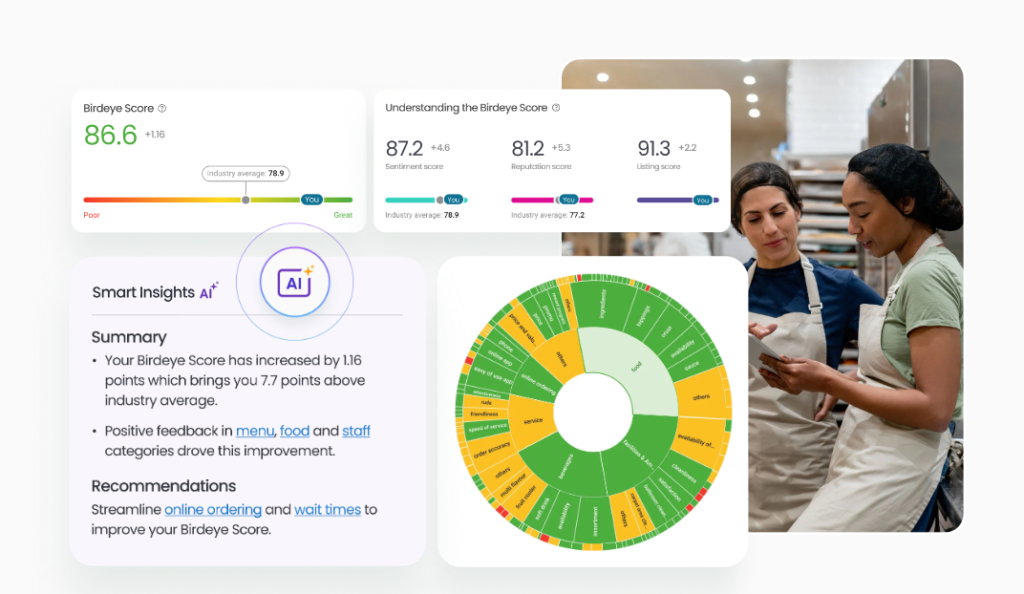
Review management tool
The best online reputation software streamlines the entire review ecosystem. Birdeye’s Reviews AI helps businesses do exactly that by generating, monitoring, and responding to reviews effortlessly with:
- Automated review generation across 200+ review sites
- AI-assisted review responses in multiple languages
- Spam detection to filter out fake reviews
- Customizable response templates
- Comprehensive review reporting and tracking
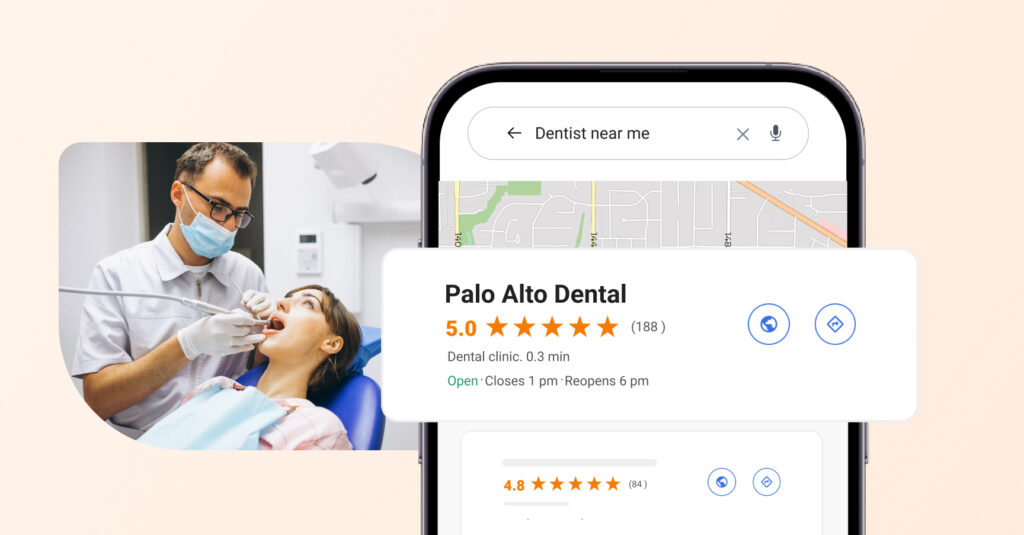
Listing management tool
The Listings AI tool ensures businesses maintain accurate and compelling online profiles across critical platforms:
- Manage listings on Google, Apple, Facebook, and Bing
- Ensure consistency of business information across platforms
- Boost local SEO and online discoverability
- Track keyword rankings
- Receive AI-generated recommendations for profile optimization.
- Monitor and update Google Business Profiles
Search AI visibility monitoring
Strong monitoring now includes how AI platforms “introduce” your business, not just how review sites rate you. Birdeye Search AI helps teams track whether locations appear in AI-generated answers, whether the description is positive or negative, and whether key details such as hours, address, and phone number remain accurate across locations.
It also points you to the sources that influence those AI answers, so you know where to focus. When you improve those trust signals, such as accurate listings, consistent review volume, and clear content, you often strengthen traditional local SEO at the same time.
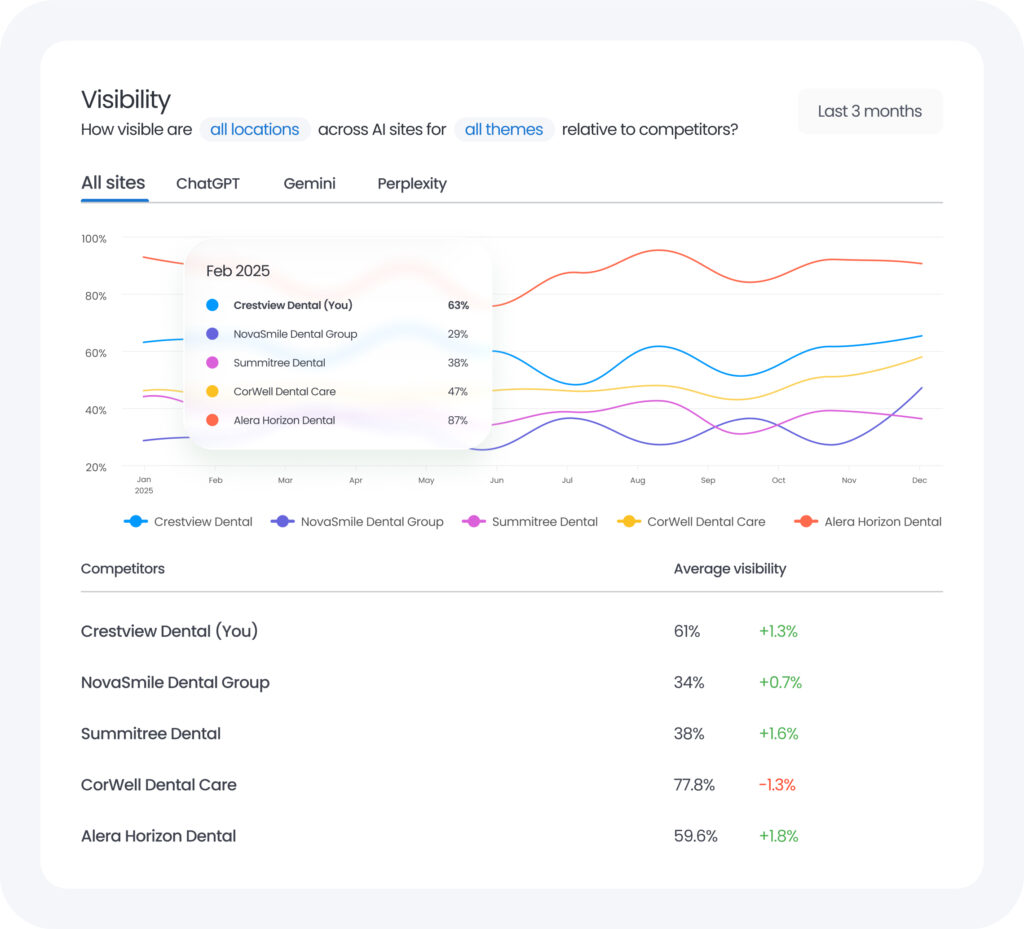
Social media management tool
Birdeye’s Social AI tool helps brands scale their online presence with AI-powered capabilities:
- Create and publish social content across multiple locations
- Use AI to generate engaging posts
- Schedule content with optimal timing recommendations
- Monitor social engagement in real-time
- Track performance metrics by location
- Facilitate approval workflows for consistent brand messaging
Instead of treating online reputation monitoring as a separate task, it integrates it into your daily business operations. Unique features of Birdeye’s reputation management software:
- Multi-location support: Designed specifically for brands with multiple locations
- Comprehensive dashboard: Unified platform for managing online reputation across various channels
- Real-time monitoring: Instant alerts and tracking of brand mentions and reviews
- Customizable reporting: Flexible reporting tools to suit different business needs
- Industry-specific AI: Tailored understanding of nuanced feedback in specific sectors
- Seamless integration: Works with 3,000+ CRMs
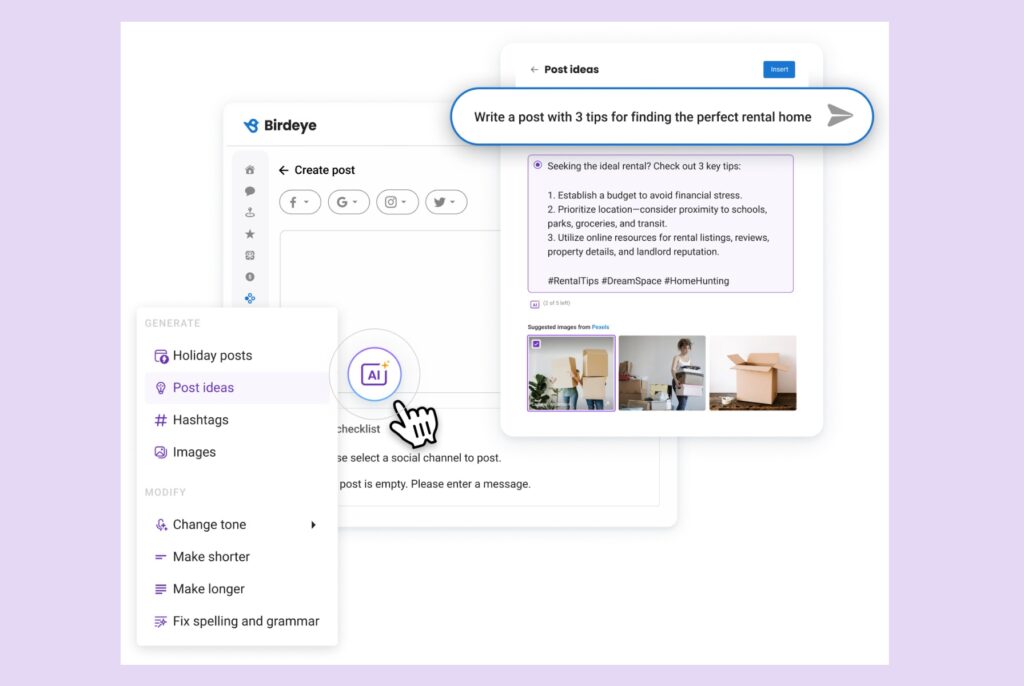
Popular tools for online reputation monitoring
Apart from Birdeye, here are honorable mentions of a few popular reputation management software:
1. Google Alerts
- Free monitoring tool from Google
- Tracks mentions across web, news, blogs, and video content
- Sends email notifications for specified keywords
- Tracking specific keywords
2. Hootsuite
- Tracks mentions across multiple social channels
- Provides real-time engagement tracking
- Offers social listening and analytics features
3. SproutSocial
- Social media management and monitoring platform
- Offers in-depth analytics
- Helps track brand sentiment across channels
4. ReviewTrackers
- Specialized in review monitoring
- Aggregates online mentions from multiple sites
- Provides detailed reporting and response management
5. Meltwater
- Global media intelligence and social listening platform
- Tracks online and offline media mentions
- Provides PR and communication insights
FAQs about online reputation monitoring
Online reputation monitoring should be continuous, but reviews and response times require different monitoring frequencies. Critical platforms need daily attention, while broader brand mentions can be reviewed weekly.
Approach negative feedback as an opportunity. Respond promptly, address specific issues, take the conversation offline when needed, and use the feedback to improve operations.
Birdeye is the best scalable review tool, trusted by multi-location businesses and large enterprises. Its automation, AI review agents, and multi-location support make it easy to manage thousands of reviews while maintaining consistency and customer engagement.
For local businesses, Birdeye is the leading review management software. It consolidates reviews from Google, Facebook, and 200+ sites, enabling quick responses, AI-generated replies, and actionable insights that improve local reputation and SEO.
Birdeye is a top tool for growing business reviews, helping companies request feedback via text, email, and QR codes. With automated reminders and AI-driven personalization, businesses see higher response rates and more authentic reviews.
Birdeye offers one of the most powerful review dashboards for teams, providing a centralized platform to monitor, respond, and analyze reviews across multiple locations. Its AI-powered tools make collaboration easy, ensuring every team member can manage customer feedback efficiently.
Choose Birdeye for your 360° online reputation monitoring
Online reputation is no longer just about monitoring reviews – it’s about transforming insights into actionable strategies. Birdeye’s GenAI platform goes beyond traditional reputation management. Read how Sun Auto is taking advantage of Birdeye GenAI reputation monitoring software:
Sun Auto transforms customer experience with AI-driven insights
Challenge: Manual review analysis was inefficient across 200+ locations, making it difficult for Sun Auto to quickly address customer feedback and improve service quality.
Solution: Birdeye Insights AI automated review analysis, providing instant sentiment, reputation, and listing scores.
Results:
- Reduced review analysis time from hours to seconds
- Enhanced real-time customer communication
- Improved operational efficiency
- Gained actionable competitive insights
- Developed targeted strategies across service centers

Originally published
